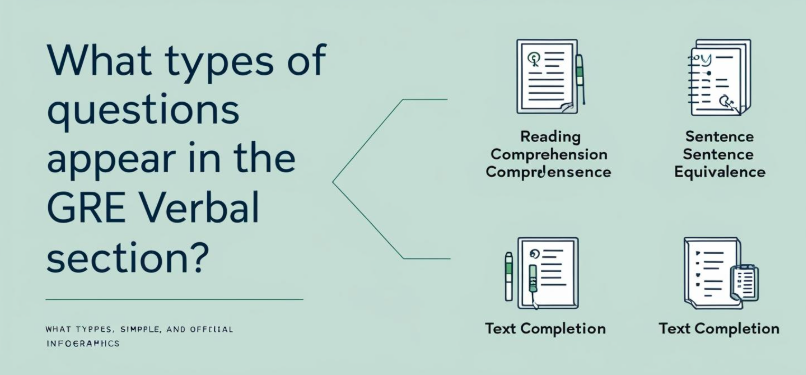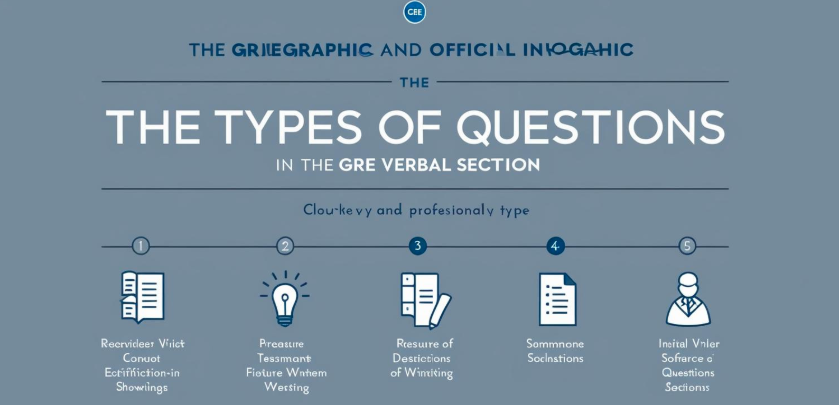Preparing for the GRE can be a daunting task, but understanding the types of questions that appear on the Verbal Reasoning section is a great place to start. At TakeMyGREExam.com, we’re here to guide you through the different question types and provide you with helpful tips to ace this section of the exam. Whether you're aiming for a high score or simply want to familiarize yourself with the structure, this article breaks it all down for you.
What is the GRE Verbal Reasoning Section?
The GRE Verbal Reasoning section tests your ability to analyze written material, evaluate arguments, and understand the meanings of words and sentences in context. This section contains 40 questions, which are divided into two sets of 20 questions each. You’ll have a total of 60 minutes to complete both sets.
The questions in the Verbal Reasoning section are designed to assess your ability to think critically and make logical decisions based on the information provided in the reading passages. The goal is not just to test your vocabulary, but your overall reading and reasoning skills.
The Types of Questions in the GRE Verbal Section
Understanding the types of questions in the GRE Verbal section is key to strategizing your study plan. Here are the primary question types you will encounter:
1. Reading Comprehension
Reading Comprehension questions are designed to evaluate how well you can understand, interpret, and analyze written passages. These passages can cover a wide variety of topics including literature, history, science, and the arts. Typically, you will be given a passage followed by 3–6 questions related to it.
What you’ll need to do:
-
Identify the main idea, tone, and purpose of the passage.
-
Understand the author’s argument and how different pieces of the passage support it.
-
Make inferences based on the text.
Tip: Focus on understanding the big picture of the passage rather than trying to memorize details. Often, the correct answers are those that best reflect the author’s overall viewpoint.
2. Text Completion
Text Completion questions present a short passage with missing words, and your task is to select the most appropriate word(s) from a set of choices to fill in the blanks. These questions assess your ability to use context clues and infer meaning based on the passage.
What you’ll need to do:
-
Read the entire sentence or passage first.
-
Think about the overall meaning and tone of the passage.
-
Eliminate choices that don't fit contextually.
Tip: Pay attention to the structure of the sentence and the logical flow of ideas. You’ll often find clues in surrounding words or phrases that can help you determine the missing word.
3. Sentence Equivalence
Sentence Equivalence questions involve a single sentence with a blank space. You are asked to choose two words that best complete the sentence, both logically and meaningfully. This tests your understanding of sentence structure and vocabulary.
What you’ll need to do:
-
Focus on the sentence’s meaning and tone.
-
Identify words that fit both grammatically and contextually.
-
Choose two words that create a sentence with a similar meaning.
Tip: Sometimes, more than one answer might seem correct. Always choose the pair of words that give the sentence the most coherent and logically consistent meaning.
4. Vocabulary in Context
While GRE Verbal is not purely a vocabulary test, you will encounter questions that focus on how well you understand and use words in context. These questions ask you to pick the word that best fits the meaning of a sentence, given the surrounding context.
What you’ll need to do:
-
Pay close attention to how the word functions in the sentence.
-
Consider synonyms and antonyms for the options available.
-
Choose the word that makes the most sense in the context.
Tip: Use your knowledge of vocabulary and context to make an educated guess, but remember that understanding the broader meaning of the passage is key.
How to Succeed in the GRE Verbal Section
Now that you know what types of questions you’ll face, let’s dive into some strategies to help you succeed.
1. Practice Active Reading
Reading regularly whether it's news articles, books, or academic papers will improve your ability to quickly grasp key ideas and arguments. Active reading means engaging with the text and asking yourself questions as you read.
2. Expand Your Vocabulary
While vocabulary isn’t the main focus, having a solid understanding of words and their meanings will definitely help, especially in Sentence Equivalence and Text Completion questions. Learn new words in context and practice using them in sentences.
3. Take Timed Practice Tests
One of the best ways to prepare for the GRE Verbal section is to practice with timed tests. This will help you get comfortable with the pacing and ensure that you don’t spend too much time on any single question.
4. Use Process of Elimination
If you’re stuck between two choices, eliminate the ones that clearly don’t make sense or don’t fit the context. This will improve your chances of picking the correct answer.
Frequently Asked Questions (FAQs)
1. How many questions are there in the GRE Verbal section?
There are 40 questions in the GRE Verbal Reasoning section, divided into two sets of 20 questions each.
2. How much time do I have to complete the GRE Verbal section?
You’ll have 60 minutes to complete the entire GRE Verbal section, meaning you’ll need to pace yourself to ensure you finish all the questions.
3. What types of questions are in the GRE Verbal section?
The main types of questions include Reading Comprehension, Text Completion, Sentence Equivalence, and Vocabulary in Context.
4. How can I improve my performance in the GRE Verbal section?
To improve, focus on building your reading comprehension skills, expanding your vocabulary, practicing timed tests, and learning to identify key ideas in passages quickly.
5. Do I need to memorize vocabulary for the GRE?
While memorizing vocabulary is helpful, the GRE focuses more on your ability to understand words in context. It's more important to know how words fit into sentences and passages.
Final Thoughts
At TakeMyGREExam.com, we want you to feel confident as you tackle the GRE Verbal section. By understanding the types of questions ad practicing regularly, you’ll be well on your way to achieving a high score. Remember, preparation is key, and with the right mindset, you can take on the GRE with confidence.


